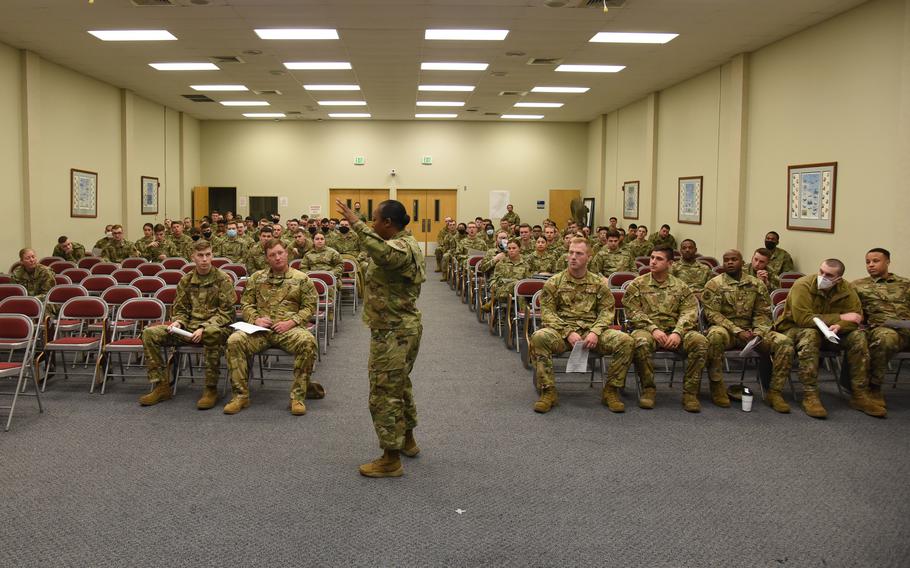
Senior Master Sgt. Jacqueline Barnwell addresses junior enlisted airmen at Sumpter Smith Joint National Guard Base, Ala., in February 2022. (Nicholas Faddis/U.S. Air National Guard)
WASHINGTON — The White House on Tuesday objected to a congressional proposal to give junior enlisted service members a nearly 20% pay raise and eliminate marijuana testing for military applicants.
Both provisions are part of the House’s draft of the National Defense Authorization Act, a bill that will set policies for the Pentagon for fiscal 2025. The pay increase in particular is a key element of House lawmakers’ efforts to improve quality of life for service members.
The White House said it “strongly opposes” making significant, permanent changes to the basic pay schedule ahead of a quadrennial review of military compensation expected to be completed early next year.
“The House proposed changes would lead to pay compression in some parts of the enlisted military basic pay table,” the Office of Management and Budget wrote in a statement of administration policy.
House lawmakers are proposing a 15% pay hike for junior enlisted service members on top of a 4.5% pay raise that the White House is requesting for all troops. The House plan would cost $3.3 billion in fiscal 2025 and more than $21.9 billion from 2025 to 2029, according to the White House.
Rep. Adam Smith of Washington, the top Democrat on the House Armed Services Committee, defended the additional pay increases while advocating for the authorization bill before the House Rules Committee on Tuesday.
“Many of our junior enlisted are struggling to afford housing. As housing costs have gone up, their pay has not kept pace,” he said. “This is a bold step to try to make sure that we support them, which incidentally will also help with recruitment and retention.”
Rep. Austin Scott, R-Ga., called the targeted pay increase for junior enlisted troops “extremely necessary” and said he was aware of the announcement of the White House’s opposition.
“I wish the president had not done that,” he said.
The House began working to set up a vote on the authorization bill Tuesday while the Senate Armed Services Committee is expected to release its version of the legislation by the end of the week. Both versions will need to be reconciled before a final bill is signed into law.
The White House also came out against a House proposal to increase the eligibility and payment thresholds from 150% to 200% of federal poverty guidelines for the military’s basic needs allowance, a supplemental monthly stipend.
The measure as written now would exclude the value of the basic allowance for housing from eligibility calculations and result in a “much less targeted expansion of payments,” the White House argued. It would also cost $2.8 billion that is not in the budget.
The administration also rejected a proposal to end marijuana testing for recruits and incoming officers to the military. The White House said it appreciated the desire of lawmakers to increase the applicant pool but said “the use of marijuana by service members is a military readiness and safety concern.”
Other objections to the House bill focused on provisions that targeted culture war issues.
One of them bans affirmative action at the military service academies. The White House said the academies use a range of factors to measure character, work ethic and leadership, and the reduction of selection criteria to numerical scores of merit would harm non-traditional students.
“If this provision were enacted, it would limit the service academies from selecting the most qualified candidates and have adverse consequences on the ability to develop a class that is representative of the entire nation,” the White House said.
The House bill’s provisions that gut diversity, equity and inclusion offices within the Defense Department were also criticized. The White House argued the offices were critical to recruiting and retaining diverse perspectives, experiences and skillsets.
Separately, the administration said it disagreed with a proposal to establish a Drone Corps as a basic branch of the Army as well as deviations from the president’s shipbuilding plans, including restrictions on decommissioning cruisers.